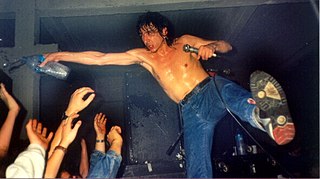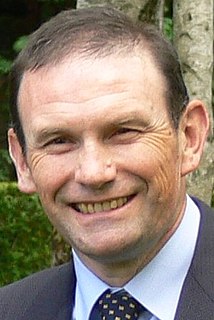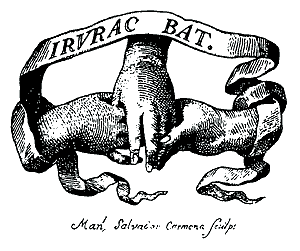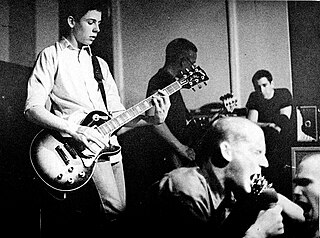
Cumbia[ˈkumbja] is a folkloric rhythm and dance from Colombia. The origin of cumbia music comes from the days of slavery in the late 17th century and is derived from the African word “cumbe” which means dance. The basic cumbia steps originate from the fact that when the music itself was born, the slaves had their legs shackled and very minimal movement was possible. Another word was later derived later in the Antioquia region of Colombia called caracumbe and was coined by African slaves who worked in the mines. A third variation of the word called paracumbé emerged and then disappeared as well as the term cumbancha which in Cuba means party. One thing is for certain, cumbia was born of a cultural melting of Black and Indígena backgrounds. By the 1940s cumbia began spreading from the coast to other parts of Colombia alongside other costeña form of music, like porro and vallenato. Clarinetist Lucho Bermúdez helped bring cumbia into the country's interior. The early spread of cumbia internationally was helped by the number of record companies located on the coast. Originally a working-class populist music, cumbia was frowned upon by the elites, but as the music pervaded class association with the music subsided in Colombia and cumbia became a shared music in every sector of society.

La Polla Records was a Spanish punk rock band from the Basque Autonomous Community, formed in 1979 in Salvatierra/Agurain, a small town in the Basque Country (Spain). Its founders were Evaristo on vocals, Maleguin on bass, Fernandito on drums and Txarly and Sumé on guitars. The name was somewhat controversial because in Spanish, "polla" is vulgarly slang for "cock, penis". The lyrics of the band harshly criticized fascism, militarism, capitalism, and catholicism. La Polla Records has been very influential in the Spanish-language punk scene.

Eskorbuto are a punk band from Santurtzi that formed in 1980. They have been one of the most influential bands for Spanish and Latin American punk rock. They are known for their strong attitude and crude lyrics. They were one of the first bands to perform punk with lyrics in Spanish. Eskorbuto is a modified word taken from escorbuto . Along with the band La Polla Records, Eskorbuto has been very influential in the Spanish rock and punk scene.
Txabi Etxebarrieta, also known as Xabier Etxebarrieta Ortiz was a Basque nationalist and anti-fascist who was a popular leader of the armed separatist organisation Euskadi ta Askatasuna (ETA). Although being a poet and an essayist, he never published his work.

Berria is the only daily newspaper published wholly in the Basque language and which can be read in the entirety of the Basque country. It was created after the closure of the previous Basque language newspaper, Egunkaria, by the Spanish government, after being accused of having ties with ETA. The newspaper shutdown was regarded by many as an attack on freedom of speech and the Basque language. After 7 years, in April 2010, the editorial team were found not guilty and acquitted.

Berri Txarrak is a Basque rock power trio whose songs are sung in Basque. It was founded in 1994 in Lekunberri, Navarre, Spain.

Union, Progress and Democracy is a Spanish political party founded in September 2007. It is a social liberal party which rejects any form of non-Spanish nationalism, especially the separatist Basque and Catalan movements. The party is deeply pro-European and wants the European Union to adopt a federal system without overlap between the European, national and regional governments. Besides, the magenta party wants to replace the State of Autonomies with a symmetric and highly centralized, albeit still federal, system in Spain as well as substituting a more proportional election law for the current one.

César Vidal Manzanares, born 1958 in Madrid, is a Spanish radio host, lawyer turned historian and author. He is doctor in history from UNED, the most important Spanish University in numbers, where he was Professor-tutor during 8 years. His thesis received the Valedictorian Academic Award in 1991. He has a PhD in Law in University Alfonso X, El Sabio, in Theology and Philosophy by Logos University, where he is a member of the Board of Regents. He is also a member of the Executive Council of the Inter-american Institute for Democracy. He is also member of the Academia Norteamericana de la Lengua Española since 2015. He has been collaborator of several media, as El Mundo, Diario 16, Periodico de Aragon and La Razon. He has hosted the radio show La Linterna on Cadena COPE from 2004 to 2009. That year he quit COPE to launch with Federico Jiménez Losantos a liberal radio, esRadio. In 2013 he abandoned that project too, due to disagreements with Jiménez Losantos.[5] Since 2014 he is the host of La Voz, a radio program broadcast from U.S.A, that has an international daily audience of over 600.000.

The 2001 Basque regional election was held on Sunday, 13 May 2001, to elect the 7th Parliament of the Basque Autonomous Community. All 75 seats in the Parliament were up for election.

The 1998 Basque regional election was held on Sunday, 25 October 1998, to elect the 6th Parliament of the Basque Autonomous Community. All 75 seats in the Parliament were up for election.

Investigations Police of Chile are the civilian police of Chile. Founded in 1933, it is one of two Chilean police bodies, along with the military police Carabineros de Chile. The PDI is the principle law enforcement arm of the Public Ministry of Chile in criminal investigation.

Basque Radical Rock, was a musical genre born in the Southern Basque Country at the beginning of the 1980s and, although there was no specific event, it is considered to have ended in the last years of the decade. Basque Radical Rock bands were particularly influenced by punk bands like Sex Pistols and The Clash. It was considered an underground movement, born in opposition to the values proclaimed by Francisco Franco and spread by thousands of people who felt with the Spanish transition to democracy their Basque national and social aspirations were betrayed.

R.I.P. was a hardcore punk group from Mondragón, Basque Autonomous Community (Spain), and were part of the Basque Radical Rock musical movement in the early 1980s. By 2014, three of the band's classic four members — lead singer Karlos "Mahoma" Agirreurreta, bassist "Portu" Mancebo and guitarist Jul Bolinaga — had died.

The Royal Basque Society of Friends of the Country, also known as La Bascongada or Bascongada Society, was founded in the mid-18th century to encourage the scientific, cultural and economic development of the Basque Country.
Salsa dura, also known as salsa brava or salsa gorda, is a style of salsa music developed in the 1970s with an emphasis on the instrumental part of the music over the lead vocals. The genre originated in New York City where large ensembles such as Fania All-Stars adapted the salsa genre to a descarga format. Modern salsa dura bands include La Excelencia, Spanish Harlem Orchestra, Wayne Gorbea, Jimmy Bosch, Orquesta La Puntualidad and Orquesta La 33. The term is often used in contrast to salsa romántica, the Latin pop-oriented subgenre of salsa that has predominated since the late 1980s.

Bbs Paranoicos is a Chilean punk rock band formed in 1991. They are one of the most popular punk bands in Chile alongside Fiskales Ad-Hok and Los Miserables.
Triple A was a Spanish far-right paramilitary, Spanish nationalist group active from 1977 to 1982, primarily in the southern Basque Country but also in the French Basque Country and Barcelona. A June 2010 report by the Office for Victims of Terrorism of the Basque Government attributed eight murders with 66 deathly victims in the Basque Autonomous Community to the group and linked it to the Spanish police, SECED and the Guardia Civil. The group attacked the satirical magazine El Papus in Barcelona, killing one person and injuring 17.
Domingo Lorenzo Rodríguez is a Spanish politician. He was elected to the Congress of Deputies in the December 20, 2015 general election, standing as a Ciudadanos (C's) candidate in Castellón province.

Demolición is a song by the Peruvian rock band Los Saicos. It was the second promotional single and quickly became a success in their country.
Magdalena Araceli Mouján Otaño (1926–2005) was an Argentine mathematician of Basque descent, a pioneer of Argentine computer science, operations research, and nuclear physics, and an award-winning science fiction author.















